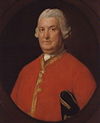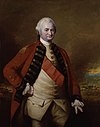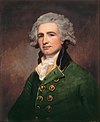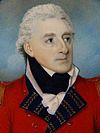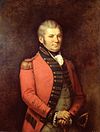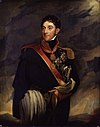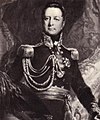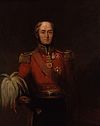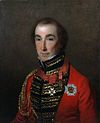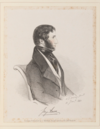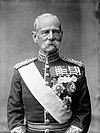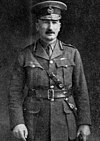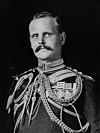Commander-in-Chief, India
| Commander-in-Chief, India | |
|---|---|
| British Indian Army | |
| Status | Senior-most officer of the British Indian Army |
| Reports to | Governor-General of India |
| Seat | GHQ India |
| Term length | No fixed term |
| Formation | January 1748 |
| First holder | Major general Stringer Lawrence |
| Final holder | FM Sir Claude Auchinleck |
| Abolished | 15 August 1947 |
| Succession | Commanders-in-Chief of the Indian Army and Pakistan Army |
| Unofficial names | Commander-in-Chief in or of India |
During the period of the Company rule in India and the British Raj, the Commander-in-Chief, India (often "Commander-in-Chief in or of India") was the supreme commander of the British Indian Army. The Commander-in-Chief and most of his staff were based at GHQ India, and liaised with the civilian Governor-General of India. Following the Partition of India in 1947 and the creation of the independent dominions of India and Pakistan, the post was abolished. It was briefly replaced by the position of Supreme Commander of India and Pakistan before the role was abolished in November 1948.[1] Subsequently, the role of Commander-in-Chief was merged into the offices of the Commanders-in-Chief of the independent Indian Army and Pakistan Army, respectively, before becoming part of the office of the President of India from 1950 and of the President of Pakistan from 1956.
Prior to independence, the official residence was the Flagstaff House, which later became the residence of the first Prime Minister of India; as Teen Murti Bhavan (Teen Murti House), it is now a museum.
This is a list of people who were the military Commander-in-Chief, India until 1947. The rank and title are the final ones for the officer's career and not necessarily applicable to his tenure as Commander-in-Chief, India.
List of Commanders-in-Chief[edit | edit source]
Commanders-in-Chief have been:[2][3]
† denotes people who died in office.
Commanders-in-Chief of India, 1748–1801[edit | edit source]
| No. | Portrait | Commander-in-Chief | Took office | Left office | Time in office | Notes |
|---|---|---|---|---|---|---|
| 1 | Major general Stringer Lawrence (1697–1775) | January 1748 | 1754 | 5–6 years | Foiled plans of Joseph François Dupleix to conquer southern India for France. Reorganized the Madras Army. | |
| 2 | Lieutenant general John Adlercron (1691–1766) | January 1748 | 1754 | 0 years | ||
| 3 | Major general Robert Clive (1725–1774) | December 1756 | February 1760 | 3 years, 62 days | Established the military supremacy of the East India Company in southern India and Bengal. | |
| 4 | Brigadier general John Caillaud (1726–1812) | February 1760 | December 1760 | 304 days | Active in southern India against the French until 1759 when he was dispatched to Bengal. | |
| 5 | Brigadier general John Carnac (1716–1800) | December 1760 | April 1761 | 121 days | Defeated the Mughal emperor near Bihar. | |
| 6 | Lieutenant general Sir Eyre Coote (1726–1783) | April 1761 | 1763 | 1–2 years | Captained the 39th Regiment, the first British regiment sent to India. | |
| 7 | Major Thomas Adams (1730–1764) | 1763 | January 1764 | 0–1 years | Officiating. | |
| (5) | Brigadier general John Carnac (1716–1800) | January 1764 | July 1764 | 182 days | 2nd time appointment as Commander-in-Chief. Promoted to brigadier general during this time. | |
| 8 | General Sir Hector Munro (1726–1805) | July 1764 | January 1765 | 184 days | Suppressed sepoy mutiny at Patna. Won the victories of Buxar against Shuja-ud-Daula, the Nawab of Awadh, and Mir Qasim, which ranks amongst the most decisive battles ever fought in India. | |
| (5) | Brigadier general John Carnac (1716–1800) | January 1765 | May 1765 | 120 days | 3rd appointment as Commander-in-Chief. Defeated the Maratha Empire in the Doab. | |
| (3) | Major general Robert Clive (1725–1774) | May 1765 | January 1767 | 1 year, 245 days | 2nd time appointment as Commander-in-Chief. | |
| 9 | Brigadier general Richard Smith (1734–1803) | January 1767 | March 1770 | 3 years, 59 days | Exerted considerable influence in the East India Company, and was a prominent creditor of the Nawab of Arcot. | |
| 10 | Brigadier general Sir Robert Barker (1732–1789) | March 1770 | December 1773 | 3 years, 275 days | Signed a treaty with the Rohillas against the Maratha Empire. | |
| 11 | Colonel Charles Chapman (1716–1795) | December 1773 | January 1774 | 31 days | Civil servant of the East India Company who studied tribal ethnicities and cultures, and reported his findings to the Bengal Government. | |
| 12 | Brigadier general Alexander Champion | January 1774 | November 1774 | 304 days | – | |
| 13 | Lieutenant general John Clavering (1722–1777) | November 1774 | 30 August 1777 † | 2 years, 302 days | – | |
| 14 | Lieutenant general Giles Stibbert (1734–1809) | October 1777 | March 1779 | 1 year, 151 days | Officiating. | |
| (6) | Lieutenant general Sir Eyre Coote (1726–1783) | March 1779 | April 1783 | 4 years, 31 days | Reappointment. Won the Battle of Porto Novo against odds of five to one, regarded as one of the greatest feats by the British in India. | |
| (14) | Lieutenant general Giles Stibbert (1734–1809) | April 1783 | July 1785 | 2 years, 91 days | Reappointment. | |
| 15 | General Sir Robert Sloper (1729–1802) | July 1785 | September 1786 | 1 year, 62 days | – | |
| 16 | General The Earl Cornwallis (1738–1805) | September 1786 | October 1793 | 1 year, 62 days | Promulgated the Permanent Settlement of Bengal. Served twice as Governor-General of India. | |
| 17 | General Sir Robert Abercromby (1740–1827) | October 1793 | January 1797 | 3 years, 92 days | Officiating. | |
| 18 | Major general Charles Morgan (1741–1818) | January 1797 | May 1798 | 1 year, 120 days | Officiating. | |
| 19 | Field Marshal Sir Alured Clarke (1744–1832) | May 1798 | February 1801 | 2 years, 276 days | – |
Commanders-in-Chief of India, 1801–1857[edit | edit source]
| No. | Portrait | Commander-in-Chief | Took office | Left office | Time in office | Notes |
|---|---|---|---|---|---|---|
| 1 | General Sir James Craig (1748–1812) | February 1801 | March 1801 | 28 days | Officiating. | |
| 2 | General Gerard Lake (1744–1808) | March 1801 | July 1805 | 4 years, 122 days | Improved the Indian Army by making all arms, infantry, cavalry and artillery, more mobile and more manageable. | |
| 3 | General The Earl Cornwallis (1738–1805) | July 1805 | October 1805 | 92 days | Reappointment. With Sir Arthur Wellesley, he supervised the Second Anglo-Maratha War against the Sindhia and the Holkar. | |
| (2) | General The Lord Lake (1744–1808) | October 1805 | 1806 | 0–1 years | Reappointment following the death of Cornwallis' successor John Graves Simcoe. Upon Cornwallis' death, Lake pursued the Holkar to the Punjab. The Holkar capitulated at Amritsar in December 1805. | |
| 4 | General John Simcoe (1752–1806) | 1806 | 26 October 1806 † | 0 years | Appointed to post in England in late 1805, but died before departing for India and replaced by Lake. | |
| (2) | General The Lord Lake (1744–1808) | 1806 | October 1807 | 0–1 years | Reappointment following death of John Simcoe, who died after accepting the appointment in England. | |
| 5 | General Sir George Hewett (1750–1840) | October 1807 | December 1807 | 61 days | Transformed Meerut into a British stronghold that would be used as a launching point for future military campaigns into northern India. | |
| 6 | Lieutenant general Forbes Champagné (1754–1816) | December 1807 | January 1811 | 3 years, 31 days | Officiating. | |
| 7 | Field Marshal Sir George Nugent (1757–1849) | January 1811 | October 1813 | 2 years, 273 days | – | |
| 8 | General The Earl of Moira (1754–1826) | October 1813 | January 1823 | 9 years, 92 days | 1st Marquess of Hastings from 1816; Oversaw British forces in the Gurkha War; conquered the Marathas; repaired the Mogul canals in Delhi; instituted educational reforms. | |
| 9 | General Sir Edward Paget (1775–1849) | January 1823 | October 1825 | 2 years, 273 days | – | |
| 10 | Field Marshal The Lord Combermere (1773–1865) | October 1825 | January 1830 | 4 years, 92 days | 1st Viscount Combermere from 1827. | |
| 11 | General The Earl of Dalhousie (1770–1838) | January 1830 | January 1832 | 2 years, 0 days | Began the British suppression of the Thuggee murder-cults. | |
| 12 | Lieutenant general Sir Edward Barnes (1776–1838) | January 1832 | October 1833 | 1 year, 273 days | Constructed the military road between Colombo and Kandy, made the first census of the population, and introduced coffee cultivation. | |
| 13 | General Lord William Bentinck (1774–1839) | October 1833 | March 1835 | 1 year, 151 days | Suppressed the Hindu custom of sati. Reappointed in April 1834. | |
| 14 | General Sir James Watson (1772–1862) | March 1835 | September 1835 | 184 days | Established the famous police organisation known as the "Thuggee and Dacoity Department" within the Government of India. | |
| 15 | General Sir Henry Fane (1778–1840) | September 1835 | December 1839 | 4 years, 91 days | – | |
| 16 | General Sir Jasper Nicolls (1778–1849) | December 1839 | August 1843 | 3 years, 243 days | Officiating. | |
| 17 | Field Marshal Hugh Gough (1779–1869) | August 1843 | May 1849 | 5 years, 273 days | 1st Baron Gough from 1846; Defeated the Mahrattas at Maharajpur. Conducted operations against the Sikhs and won the battles of Mudki, Ferozeshah and Sobraon. Soon after, the Sikhs surrendered at Lahore. | |
| 18 | General Sir Charles James Napier (1782–1853) | May 1849 | December 1851 | 2 years, 214 days | Conquered Sindh and made it part of Bombay Presidency. | |
| 19 | Field Marshal Sir William Gomm (1784–1875) | December 1851 | January 1856 | 4 years, 31 days | – | |
| 20 | Major general George Anson (1797–1857) | January 1856 | 27 May 1857 † | 1 year, 146 days | Outbreak of the Indian Rebellion of 1857. Died of cholera during his march against the Indian Rebellion at Delhi. | |
| 21 | Lieutenant general Sir Patrick Grant (1804–1895) | June 1857 | August 1857 | 87 days | Directed operations against the Indian Rebellion, sending forces under Havelock and Outram for the relief of Cawnpore and Lucknow, until the arrival of Sir Colin Campbell from England. | |
| 22 | General Sir Colin Campbell (1792–1863) | August 1857 | 4 June 1861 | 3 years, 307 days | 1st Baron Clyde from 1858; Abandoned then recaptured Lucknow. Supervised military operations in Oudh until the Indian Rebellion had been subdued. |
Commanders-in-Chief of India, 1861–1947[edit | edit source]
| No. | Portrait | Commander-in-Chief | Took office | Left office | Time in office | Notes |
|---|---|---|---|---|---|---|
| 1 | Lieutenant general Sir Hugh Rose (1801–1885) | 4 June 1861 | 23 March 1865 | 3 years, 292 days | Improved discipline and enabled the amalgamation of the East India Company's army into the Queen's army to be carried out. | |
| 2 | General Sir William Mansfield (1819–1876) | 23 March 1865 | 9 April 1870 | 5 years, 17 days | Prior to his appointment, Mansfield served in the Sutlej campaign, commanded the 53rd Regiment in the Punjab, and was part of Peshawar operations in the northwest frontier. | |
| 3 | General The Lord Napier of Magdala (1810–1890) | 9 April 1870 | 10 April 1876 | 6 years, 1 day | He did much to benefit the army and to encourage good shooting. | |
| 4 | General Sir Frederick Haines (1819–1909) | 10 April 1876 | 8 April 1881 | 4 years, 363 days | – | |
| 5 | General Sir Donald Stewart (1824–1900) | 8 April 1881 | 28 November 1885 | 4 years, 234 days | – | |
| 6 | Lieutenant general Sir Frederick Roberts (1832–1914) | 28 November 1885 | 8 April 1893 | 7 years, 131 days | 1st Baron Roberts of Kandahar | |
| 7 | General Sir George White (1835–1912) | 8 April 1893 | 20 March 1898 | 4 years, 346 days | – | |
| 8 | General Sir Charles Nairne (1836–1899) | 20 March 1898 | 4 November 1898 | 229 days | Officiating. | |
| 9 | General Sir William Lockhart (1841–1900) | 4 November 1898 | 18 March 1900 † | 1 year, 134 days | – | |
| 10 | General Sir Arthur Palmer (1840–1904) | 19 March 1900[4] | 28 November 1902 | 2 years, 254 days | – | |
| 11 | General The Viscount Kitchener (1850–1916) | 28 November 1902 | 10 September 1909 | 6 years, 286 days | Reconstructed the disorganised Indian Army, but quarreled with the Viceroy Lord Curzon, who resigned. | |
| 12 | General Sir O'Moore Creagh (1848–1923) | 10 September 1909 | 8 March 1914 | 4 years, 179 days | Douglas Haig, then a lieutenant general, served as Chief of the General Staff (India) in 1909–12. | |
| 13 | General Sir Beauchamp Duff (1855–1918) | 8 March 1914 | 1 October 1916 | 2 years, 207 days | – | |
| 14 | General Sir Charles Monro (1860–1929) | 1 October 1916 | 21 November 1920 | 4 years, 51 days | – | |
| 15 | General The Lord Rawlinson (1864–1925) | 21 November 1920 | 28 March 1925 † | 4 years, 127 days | Former GOC, British Fourth Army on the Western Front. | |
| 16 | General Sir Claud Jacob (1863–1948) | 3 April 1925 | 6 August 1925 | 125 days | – | |
| 17 | Field Marshal The Lord Birdwood (1865–1951) | 6 August 1925 | 30 November 1930 | 5 years, 116 days | Distinguished commander of ANZAC troops on Gallipoli and the Western Front. | |
| 18 | Field Marshal The Lord Chetwode (1869–1950) | 30 November 1930 | 30 November 1935 | 5 years, 0 days | The Indian Military Academy was established during his tenure. | |
| 19 | General Sir Robert Cassels (1876–1959) | 30 November 1935 | 27 January 1941 | 5 years, 58 days | – | |
| 20 | General Sir Claude Auchinleck (1884–1981) | 27 January 1941 | 5 July 1941 | 159 days | Left to take command of the Middle East Command (swapped jobs with Wavell). | |
| 21 | General Sir Archibald Wavell (1883–1950) | 5 July 1941 | 5 January 1942 | 184 days | Left to take command of the short lived ABDACOM; later became Viceroy. | |
| 22 | General Sir Alan Hartley (1882–1954) | 5 January 1942 | 7 March 1942 | 61 days | – | |
| (21) | Field Marshal Sir Archibald Wavell (1883–1950) | 7 March 1942 | 20 June 1943 | 1 year, 105 days | Reappointment. Sir Alan Hartley appointed Deputy C-in-C, India. | |
| (20) | Field Marshal Sir Claude Auchinleck (1884–1981) | 20 June 1943 | 15 August 1947 | 4 years, 56 days | Served as the last C-in-C, India. Reappointed 15 August 1947, and became Supreme Commander of India and Pakistan. Oversaw division of the Armed forces between the two new countries. Served in this capacity until November 1948, when the role of Supreme Commander was abolished. |
See also[edit | edit source]
- Secretary of State for India
- Governor-General of India
- Chief of the General Staff
- Chief of the Army Staff
- Commander-in-Chief of the Pakistan Army
References[edit | edit source]
- ↑ Warner (1982), p. 269
- ↑ Commanders-in-Chief Archived 2012-02-19 at the Wayback Machine Land Forces
- ↑ Army Commands Archived July 5, 2015, at the Wayback Machine
- ↑ "No. 27299". The London Gazette. 26 March 1901. p. 2114.

